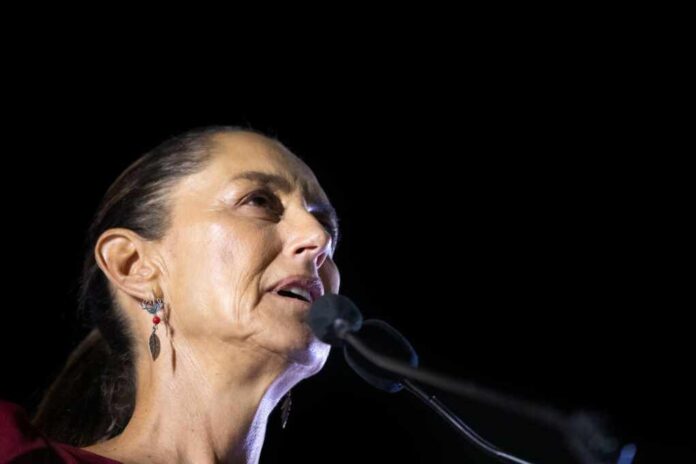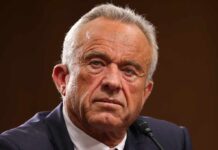
As the Trump administration escalates its battle against drug cartels, Mexican President Claudia Sheinbaum is making it clear that she will not tolerate any US-led action inside Mexico. Despite overwhelming cartel violence plaguing her country, Sheinbaum insists that Mexico will not accept intervention, a stance that has raised questions about her commitment to fighting organized crime.
🚨Update: Mexican President Claudia Sheinbaum is moving quickly to change the Mexican constitution to protect the Cartels from US attacks! Is she working for the Cartels? pic.twitter.com/Epc5Qgw3H7
— US Homeland Security News (@defense_civil25) February 21, 2025
The Trump administration recently classified several Mexican cartels as terrorist organizations, a move that expands US authority to crack down on their activities. Secretary of State Marco Rubio said the designation provides law enforcement with “additional tools” to combat these violent organizations. Tech billionaire Elon Musk, who has been given a prominent role in Trump’s administration, hinted that this classification could justify military strikes, saying it “means they’re eligible for drone strikes.”
This is Claudia Sheinbaum, Mexico's first woman president.
RIP Mexico pic.twitter.com/gIOsMAhPNR
— Clown World ™ 🤡 (@ClownWorld_) June 4, 2024
Sheinbaum, who took office after an election marred by cartel violence, pushed back against the US approach. She declared that while Mexico is willing to cooperate, it will not accept “interventionism” or “subordination.” She also vowed to propose constitutional reforms to reinforce Mexico’s sovereignty and prevent foreign military action on its soil.
🇺🇸🇲🇽MEXICO’S PRESIDENT TO U.S.: ‘NO INVASION’ OF CARTEL TERRITORY
Claudia Sheinbaum is furious after the U.S. labeled major Mexican cartels as terrorist organizations—especially after Elon suggested they could now be targeted with drone strikes.
Sheinbaum insists Mexico won’t… https://t.co/sOh8LdFECF pic.twitter.com/uwsAWtxzih
— Mario Nawfal (@MarioNawfal) February 21, 2025
Despite her tough rhetoric, Sheinbaum has taken steps to appease Washington. Mexico has carried out major drug seizures, arrested members of the Sinaloa Cartel, and increased troop deployments to the US border. These moves appear to be an effort to delay Trump’s threatened 25% tariffs rather than a genuine crackdown on cartel operations.
🚨 | BREAKING: For the first time in modern history, U.S. Air Force intelligence planes are now inside Mexican airspace after President Claudia Sheinbaum agreed to step up against the cartels.
The days of cartel rule are numbered.
President Trump demanded 100% operational… pic.twitter.com/nwELaV8YMd
— Hank™ (@HANKonX) February 3, 2025
The US has already increased its surveillance inside Mexico, flying drones to locate fentanyl labs. Reports confirm that Washington has been conducting these covert operations for years, though Sheinbaum now claims she was unaware of the full extent.
Mexico's President Claudia Sheinbaum is threatening to sue more American gun manufacturers if President officially declares the cartels terrorist organizations.
So, it seems she's literally on the side of the cartels. We've long known Mexico's government was complicit with the… pic.twitter.com/x6mC5YtNqj
— Mrgunsngear (@Mrgunsngear) February 14, 2025
While she continues to resist outside intervention, cartel violence remains a major issue in Mexico, with hundreds of thousands killed in drug-related conflicts since 2006.
‼️The drug cartels are running Mexico. Sheinbaum wiuld be dead already if she did not cooperate with them! pic.twitter.com/LqybBNOqul
— Blondelady2024 (@arva61138) February 4, 2025
🇲🇽 | Sheinbaum says calling cartels ‘terrorists’ is an ‘infringement on sovereignty’ as if Mexico hasn’t already lost its sovereignty to the cartels. They own highways, towns, politicians, and entire regions. pic.twitter.com/gzG8oBPhWC
— TexanonX™ (@TexanonX) February 20, 2025
Maybe Claudia Sheinbaum should think twice before making threats—Mexico’s cartels have been invading our sovereignty for decades.
Fentanyl flooding our streets, human trafficking at record highs, and now she wants to act tough? Fix your country, or we will.🇺🇸 pic.twitter.com/aai3VACdXI— Desiree (@DesireeAmerica4) February 21, 2025

























